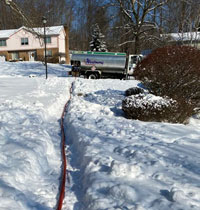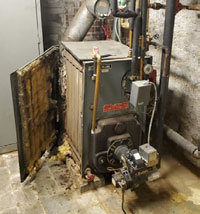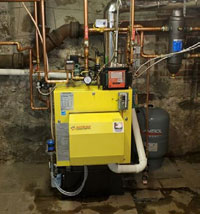
Dear Friends,
We’re sure all of you have followed the debacle of power outages in Texas and elsewhere in the wake of February’s deep freeze. It seems as if three or four times a year, a storm knocks out our power, leaving tens of thousands of families without energy for days or even weeks.
More than anything, this has exposed the fragility of the nation’s electric grid.
That’s why it’s disturbing that many state governments are rushing ahead on an “electrify everything” path to reduce carbon emissions. The problem is that however well-intended the “all electric” movement is, it is relying on breakthroughs that have not yet happened to an electric grid that is already unreliable. Consider what will happen when the electric grid is taxed by huge new demand (caused by conversions of cars, buildings, homes and more).
We believe that we must take aggressive steps to address climate change — and we’re doing that. Our company has invested in converting our fuel from traditional heating oil to Bioheat® fuel.
Alternatively, we, and others in the liquid fuels industry, continue to offer a solution that immediately reduces every customer’s carbon footprint dramatically without regressive taxes, additional equipment cost to consumers or overloading the electric grid. We need a thoughtful policy that balances the need to address our climate without putting all of our energy eggs in one fragile basket.
Warmly,
Richard C. Bologna
PS: Read more about the benefits of Bioheat fuel below.

When temperatures plummeted in February and the snow began to pile up, many of the heating companies around here were crushed by the heavy demand for service. Not Westmore! Our team pulled together and, while the conditions were tough, we kept going.
We took care of every customer who needed help, even with a huge number of calls for emergency service. In fact, we experienced a 90% increase in no-heat calls compared to the same time last year. See “the Westmore Difference keeps you warm.”
Having our own fuel terminal remains one of our strengths. This winter, we never ran out of fuel because we invest in critical resources and make careful plans to ensure that we are there for you when you need us the most.
We couldn’t have done it without our great team, heroes all. And, of course, we thank all of you for your confidence in us. Here’s to spring!
Did you know that right now, Bioheat® fuel is the only home energy source that can make an immediate impact on reducing greenhouse gas emissions for our climate?
The heating oil industry’s embrace of renewable Bioheat fuel is transforming home heating and helping to create a better future.
In fact, the heating oil industry has made a commitment to the climate change movement. In September 2019, the industry resolved to reduce greenhouse gas emissions by 15% by 2023, 40% by 2030 and to achieve net-zero carbon emissions by 2050.
What’s most exciting is that these ambitious objectives are achievable. Last year, two independent studies on the feasibility of accomplishing these emissions-reduction goals validated the industry’s plan to reach net-zero carbon emissions by 2050 with renewable Bioheat fuel. See article below.
Just two heating oil retailers in the Northeast displaced nearly 1.5 million gallons of heating oil with approved Bioheat fuel in the first half of 2020.* Doing this resulted in an 80% reduction in greenhouse gas emissions, compared to traditional heating oil.
That’s because Bioheat fuel burns more cleanly and more efficiently than conventional heating oil. You will use less heat to get the same amount of warmth, and your heating system will last longer. You’ll also likely find that you need fewer repairs on your system. All of this amounts to savings!
Bioheat fuel is readily available now and it requires no modifications to your existing system. The continued growth of Bioheat fuel puts us well on our way along the road to a low carbon future!
*Source: Diversified Energy Specialists APS Program Research, December 2020.
Biodiesel (also known as biofuel) is a gallon-for-gallon substitute for petroleum-based fuels, which have a higher carbon intensity. By 2030, it’s estimated that biodiesel will displace 529 million gallons of heating oil.
Biodiesel is a nontoxic, biodegradable renewable liquid fuel. The biofuel that’s blended with heating oil to create Bioheat fuel is generally produced by agricultural byproducts, including used cooking oil (also known as yellow grease), animal fats, inedible corn oil, soybean oil and canola oil.
This puts excess oil and fats to good use. Food is never sacrificed for fuel in the production of Bioheat fuel. Bioheat fuel is also sourced and produced right here in the United States, supporting local farmers, local industries and local economies.
Source: Biodiesel.org
It’s alarming that many state legislators continue to push for the increased use of electricity over the use of other fuels. In the case of homes, that would mean policies to replace propane, natural gas and oil-fired heating systems with electric heat pumps.
But heat pump conversions are expensive and do not work very efficiently when the weather gets cold. Plus, electricity is not a clean fuel. Electricity production generates the second largest share of greenhouse gas emissions. More than 63% of our electricity comes from burning fossil fuels, mostly coal and natural gas.*
Besides the increased impact on the environment, it is feared that an all-out “electrify everything” policy would increase the average residential household cost and put a severe strain on our aging electric grid. See article below.
*Source: https://www.eia.gov/energyexplained/electricity/electricity-in-the-us.php
The electric infrastructure in this country has failed us time and again, causing massive disruption, frustration and discomfort. We’ve all followed the tragic, widespread energy disaster that occurred this past winter in Texas. And we’ve all experienced a number of uncomfortable power outages in our own area over the years.
A large part of our grid was built more than 50 years ago. But today, it’s reaching capacity and old equipment is failing.
Considering that the U.S. Department of Energy has called the electric grid in our country the largest machine on the planet, upgrading our electric infrastructure will be a massive — and ultra-expensive — undertaking.
Until our electricity supply is less environmentally destructive and not prone to numerous blackouts, it is simply not the best choice for heating. That’s especially true when advancements in heating oil are already proving to be incredibly effective and affordable.
The last thing we need right now is for the electric grid to be strained by an enormous new demand — by electric cars, all-electric homes and commercial building and more.

Dominic Falcone, one of our oil heat experts on staff, enjoys speaking with both longtime customers and those who have recently joined us.
“My number one job is to assist customers and do everything I can to make sure they stay warm and safe in their homes, whether it involves new equipment, repairs or professional, periodic maintenance,” says Dominic, who was instrumental in setting up our new equipment financing program. See next article.
Dominic says he always approaches these conversations as he would with a family member.
“That’s not a stretch because we treat all of our customers like they’re members of our extended family. We care a lot about them.”
Off the job, Dominic enjoys time with his wife, Diane. The couple have two grown children. His interests include doing community work. Dom is a past potentate of Shriners International, supporting Shriners Hospitals for Children and sits on the board of directors of the New Rochelle Police Foundation.
During the year-plus public health crisis, we found that many customers who sorely needed new heating systems had trouble securing financing but they could not afford a new boiler or furnace without it.
That’s why Westmore Fuel now partners with the National Energy Improvement Fund (NEIF) to provide financing so our customers can take full advantage of the equipment upgrades we offer.

NEIF provides loan lengths of 3, 5 or 10 years on its EnergyPlus financing for qualifying purchases with NEIF-approved contractors like Westmore Fuel.


As (bad) luck would have it, one of our newest customers from Old Greenwich, CT, was faced with a broken-down boiler within the first month of relocating here from New York City.
We proved our unwavering commitment by responding quickly to this no-heat emergency. After doing a diagnosis, we did a temporary fix to the old system to restore the heat. This bought us time to arrange for a new equipment installation.
Within a few days, we had installed a new System 2000 high-efficiency oil boiler, matched with an indirect-fired 40-gallon water heater.
Customers who have traded in very old systems for high-efficiency models like the System 2000 have been astonished to see their annual fuel costs drop by as much as 40%.
Our new customers now have stayed warm — at a much lower cost than before. We look forward to showing them — and everyone else — the Westmore Difference for many years to come.